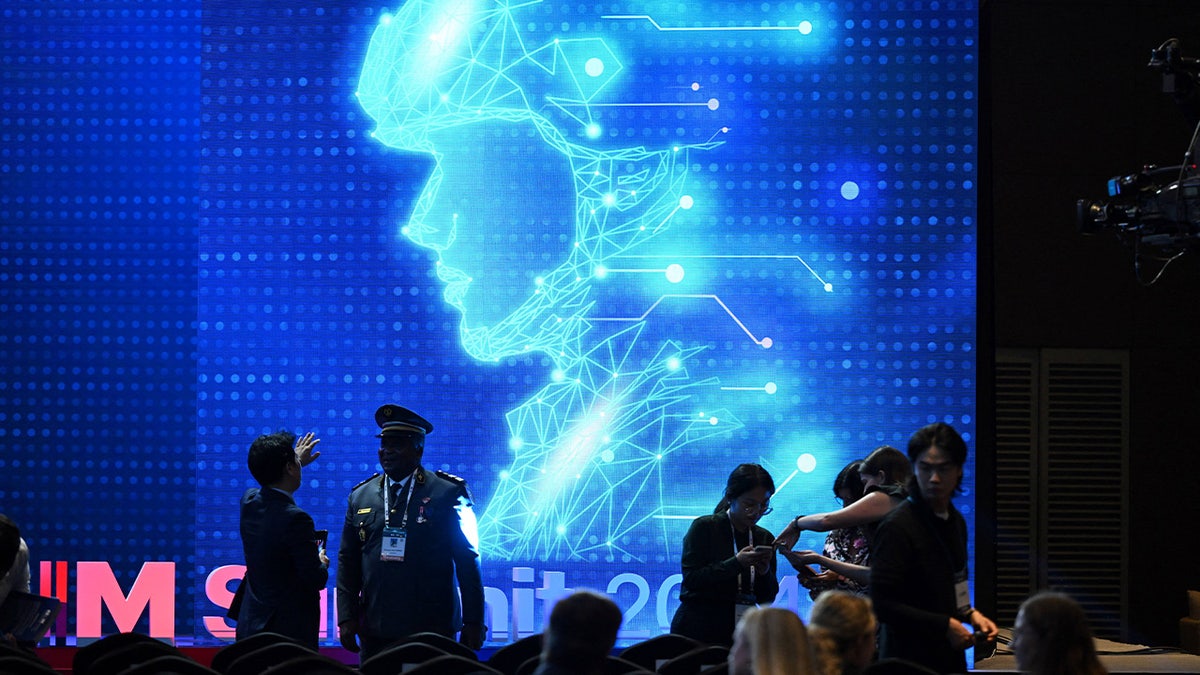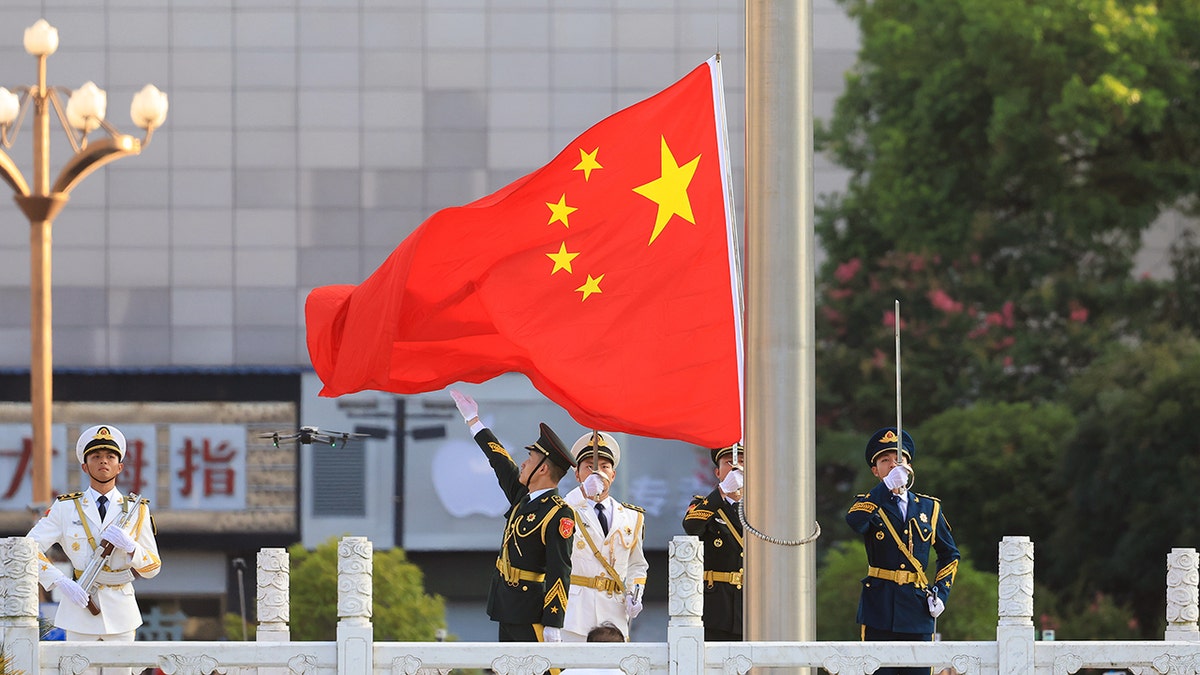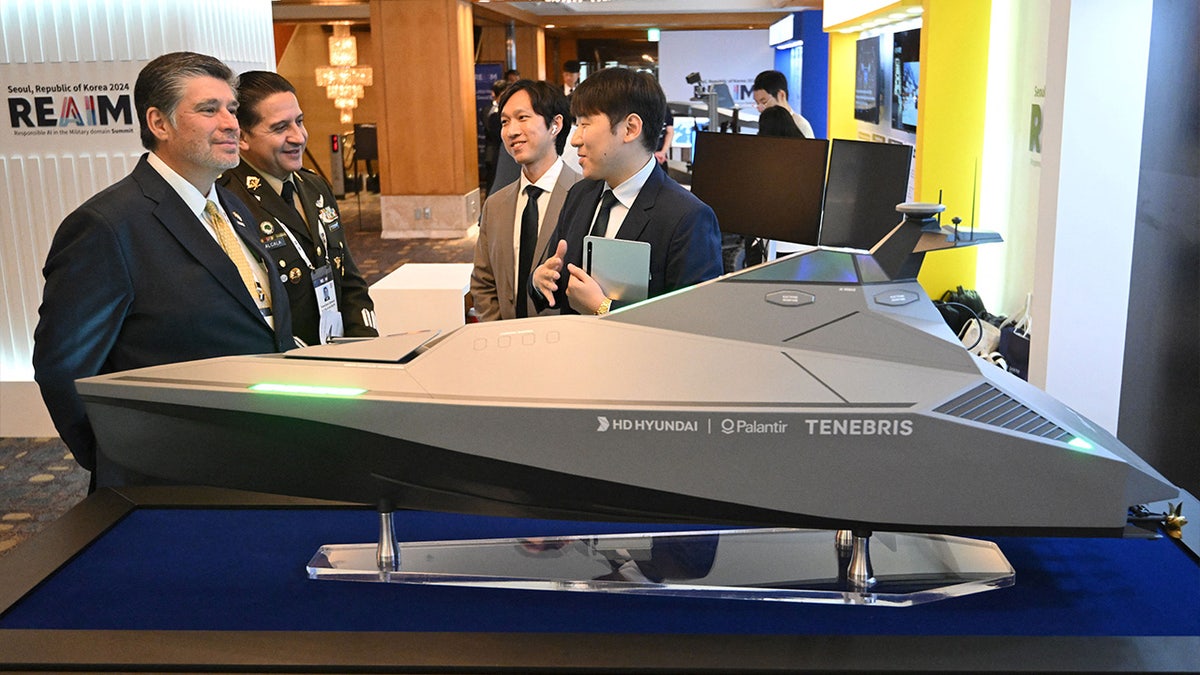[ad_1]
China this week selected to not signal onto a world “blueprint” agreed to by some 60 nations, together with the U.S., that seemed to determine guardrails when using synthetic intelligence (AI) for army use.
Greater than 90 nations attended the Accountable Synthetic Intelligence within the Navy Area (REAIM) summit hosted in South Korea on Monday and Tuesday, although roughly a 3rd of the attendees didn’t assist the nonbinding proposal.
AI knowledgeable Arthur Herman, senior fellow and director of the Quantum Alliance Initiative with the Hudson Institute, instructed Fox Information Digital that the very fact some 30 nations opted out of this vital improvement within the race to develop AI shouldn’t be essentially trigger for concern, although in Beijing’s case it’s probably due to its common opposition to signing multilateral agreements.

Individuals are proven previous to the closing session of the REAIM summit in Seoul, South Korea, on Sept. 10, 2024. (JUNG YEON-JE/AFP through Getty Photographs)
MASTERING ‘THE ART OF BRAINWASHING,’ CHINA INTENSIFIES AI CENSORSHIP
“What it boils right down to … is China is all the time cautious of any type of worldwide settlement through which it has not been the architect or concerned in creating and organizing how that settlement goes to be formed and applied,” he mentioned. “I believe the Chinese language see all of those efforts, all of those multilateral endeavors, as methods through which to attempt to constrain and restrict China’s capability to make use of AI to reinforce its army edge.”
Herman defined that the summit, and the blueprint agreed to by some 5 dozen nations, is an try to safeguard the increasing know-how surrounding AI by making certain there may be all the time “human management” over the programs in place, significantly because it pertains to army and protection issues.
“The algorithms that drive protection programs and weapons programs rely lots on how briskly they’ll go,” he mentioned. “[They] transfer shortly to collect data and knowledge that you simply then can velocity again to command and management to allow them to then make the choice.

The Guard of Honor of the Chinese language Folks’s Liberation Military performs a flag-raising ceremony at Bayi Sq. to have fun the 97th anniversary of China’s Military Day on Aug. 1, 2024, in Nanchang. (Ma Yue/VCG through Getty Photographs)
“The velocity with which AI strikes … that is vastly vital on the battlefield,” he added. “If the choice that the AI-driven system is making includes taking a human life, then you definitely need it to be one through which it is a human being that makes the ultimate name a couple of choice of that kind.”

Individuals are proven with the Tenebris, a medium-size unmanned floor vessel idea, on show on the REAIM summit in Seoul, South Korea, on Sept. 10, 2024. (JUNG YEON-JE/AFP through Getty Photographs)
Nations main in AI improvement, just like the U.S., have mentioned sustaining a human factor in severe battlefield selections is vastly vital to keep away from mistaken casualties and forestall a machine-driven battle.
ARMY PUSHES 2 NEW STRATEGIES TO SAFEGUARD TROOPS UNDER 500-DAY AI IMPLEMENTATION PLAN
The summit, which was co-hosted by the Netherlands, Singapore, Kenya and the UK, was the second of its variety after greater than 60 nations attended the primary assembly final 12 months held within the Dutch capital.
It stays unclear why China, together with some 30 different international locations, opted to not conform to the constructing blocks that look to arrange AI safeguards, significantly after Beijing backed the same “name to motion” in the course of the summit final 12 months.
When pressed for particulars of the summit throughout a Wednesday press convention, Chinese language International Ministry spokesperson Mao Ning mentioned that upon invitation, China despatched a delegation to the summit the place it “elaborated on China’s rules of AI governance.”
Mao pointed to the “International Initiative for AI Governance” put ahead by Chinese language President Xi Jinping in October that she mentioned “offers a systemic view on China’s governance propositions.”

Individuals take a look at a miniature model of the KF-21 fighter jet on show on the REAIM summit in Seoul, South Korea, on Sept. 10, 2024. (JUNG YEON-JE/AFP through Getty Photographs)
The spokesperson didn’t say why China didn’t again the nonbinding blueprint launched in the course of the REAIM summit this week however added that “China will stay open and constructive in working with different events and ship extra tangibly for humanity via AI improvement.”
CLICK HERE TO GET THE FOX NEWS APP
Herman warned that whereas nations just like the U.S. and its allies will look to determine multilateral agreements for safeguarding AI practices in army use, they’re unlikely to do a lot in the best way of deterring adversarial nations like China, Russia and Iran from growing malign applied sciences.
“Once you’re speaking about nuclear proliferation or missile know-how, the perfect restraint is deterrence,” the AI knowledgeable defined. “You pressure those that are decided to push forward with the usage of AI – even to the purpose of principally utilizing AI as type of [a] automated kill mechanism, as a result of they see it of their curiosity to take action – the best way through which you constrain them is by making it clear, for those who develop weapons like that, we will use them towards you in the identical approach.
“You do not depend on their sense of altruism or excessive moral requirements to restrain them, that’s not how that works,” Herman added.
Reuters contributed to this report.
[ad_2]
